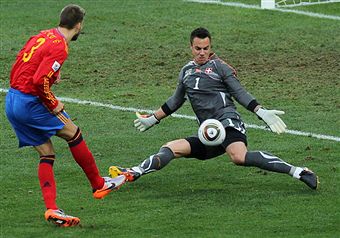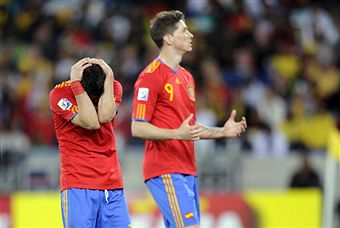By David Owen in Durban
June 17 - No team in the 80 year history of the World Cup has lost their first match and gone on to lift the trophy.
That is the reality facing European champions Spain - many people’s pre-tournament tip for the trophy - after their defeat by Switzerland on Wednesday at Durban’s magnificent new signature stadium.
Spain dominated possession and were much the better team against the Swiss.
So it is possible they can rewrite World Cup history.
But it will be hard now for Vicente Del Bosque’s men to win their group.
And if they don’t they may have to play Brazil - the clash most neutrals wanted as the World Cup final - as early as the second round.
Speaking to Spanish journalists here after the defeat, they voiced frustration that Del Bosque had not shaken things up more vigorously - perhaps introducing Athletic Bilbao target man Fernando Llorente alongside Fernando Torres - after the scrambled Swiss goal.
From my own observations, I would say that, in the first half, they didn’t shoot enough, betraying an Arsenal-like tendency to try to walk in the perfect goal, rather than chancing their arm from good positions further out.
I also think they badly missed one of the stars of their European Championship victory, holding midfielder Marcos Senna, who ironically is Brazilian-born.
Though the midfield that took to the pitch wove pretty patterns, Senna’s replacement, Sergio Busquets, looked all at sea, while Xavi, the Barcelona maestro, played so far forward it was relatively easy for Switzerland’s Gokhan Inler, to mark him if not out of the game then effectively enough to severely reduce his effectiveness.
Andrés Iniesta was brilliant for an hour (if strangely pale as if he never goes outside) before fading, while Busquets’s problems left the centre-backs more than usually exposed.
Former Manchester United man, Gerard Pique got accidentally raked on the cheek and altogether did not have a happy second half.
The space where Senna would once have been, meanwhile, was most effectively filled by Eren Derdiyok, the Swiss number 19, whose hard running precipitated the chaos that produced the Swiss goal and who later sent an infinitely more cultured effort spinning against the foot of a Spanish post.
In coach Ottmar Hitzfeld’s necessarily rigid 4-4-1-1 system, Derdiyok generally had only one team-mate to pass to - striker Blaise Nkufo - and he duly found him surprisingly often, affording the hard-working Swiss defence much-needed time to regroup.
“We needed to stay compact because Spain is a very good team,” he said afterwards.
It should also be said that Switzerland benefited - like Nigeria when they encountered Lionel Messi and Argentina - from an outstanding display by their goalkeeper.

“It was OK,” the keeper in question, Diego Benaglio (pictured), clearly a cool customer, said of his performance after the match.
“It’s a nice feeling.
“We showed today from the first minute that we believed maybe today we could get something.”
Benaglio is just 26 and already has one Bundesliga title under his belt with his club Wolfsburg.
If the Swiss progress far in the competition - and they clearly will not now be taken lightly under their distinguished German coach - it is tempting to feel he could be a contender for goalkeeper of the tournament, especially with Italy’s Gigi Buffon nursing an injury.
As for Spain, well, my Spanish friends are certainly worried, although they should have the quality to overcome Honduras and Chile.
For the match against the Central American side on Monday (June 21), I would expect Cesc Fabregas, who marched out to the team bus in Durban at least 10 minutes before any of his team-mates, to make the starting line-up.
That would enable Xavi to adopt a more withdrawn role, from where I think he would be more effective.
I might also be tempted to rest Iniesta, who picked up a knock, for the sterner test expected from Chile.
Oh and clearly Torres has to start, although he looked far from his best in the 30 minutes or so he was given against Switzerland, going through the motions with an oddly impassive expression on his face.
Yes, Spain could still defy precedent and win what would be their first World Cup.
But their performance on Friday will have cheered a lot of bookies up no end.
Contact the writer of this story at zib.l1751599755labto1751599755ofdlr1751599755owedi1751599755sni@n1751599755ewo.d1751599755ivad1751599755
David Owen is a specialist sports journalist who worked for 20 years for the Financial Times in the United States, Canada, France and the UK. He ended his FT career as sports editor after the 2006 World Cup and is now freelancing, including covering the 2008 Beijing Olympics. He is reporting for insideworldfootball from South Africa and tweeting at www.twitter.com/dodo938

